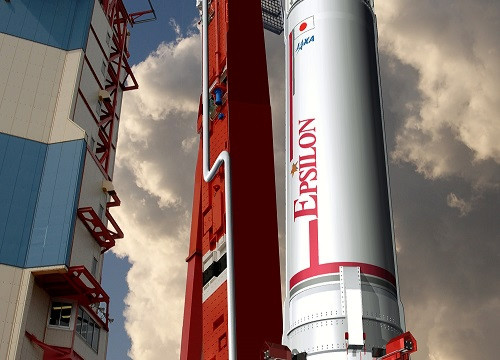Japan's Epsilon Rocket Launch Halted After Automatic Alarm Issued

The maiden flight of Japan’s newest rocket was canceled within the very last minute on Tuesday after an automatic alarm was tripped.
The launch of the Epsilon rocket was scheduled for 1:45 p.m. Japan Standard Time (12:45 a.m. Eastern Time) at the Uchinoura Space Center in southern Japan. The launch procedure seemed to go normally, but when the countdown finished, the rocket remained on the pad.
JAXA, Japan’s space agency, said in a statement that the launch was canceled “because an automatic stop alarm was issued as an attitude abnormality was detected approximately 19 seconds prior to the liftoff time during the automatic countdown sequence.”
The agency is investigating what might have led to the alarm.
Epsilon is a 78-foot tall, three-stage rocket weighing 91 tons and is designed primarily to launch satellites into low-Earth orbit. JAXA began developing the Epsilon in 2007 to replace the M-V rocket, which delivered its last payload in 2006.
The Epsilon cobbles together the upper stages of the M-V rocket with a different solid rocket booster: the H-II A, which launched, among other things, the Selene lunar orbiter in September 2007. Epsilon’s design is supposed to cut down on the cost of rocket launches, enabling more missions in the future, JAXA said. Tuesday’s launch was originally scheduled for Aug. 22, but there were concerns about Epsilon’s ground-support equipment that pushed the date back, according to Space.com.
The rocket scheduled for launch on Tuesday was carrying the Spectroscopic Planet Observatory for Recognition of Interaction of Atmosphere (Sprint-A), the first space telescope designed to remotely observe planets in our own solar system. To observe the atmospheres and magnetospheres of planets like Jupiter and Venus, Sprint-A uses an instrument that measures extreme ultraviolet radiation.
One of the mysteries Sprint-A will be investigating is the mechanism by which a planet’s atmosphere escapes into space. Eons ago, Mars likely had a water-containing atmosphere, but that has largely disappeared. On Venus, meanwhile, the runaway greenhouse effect perpetrated by that planet’s mostly carbon dioxide atmosphere causes temperatures of up to 752 degrees Fahrenheit on the surface.
The rocket also performs its own status checks automatically, reducing the time and effort put in by people on the ground.
"You may doubt that artificial intelligence can be used in a rocket, but nowadays a self-inspection function is something commonly seen in machinery," Epsilon project manager Yasuhiro Morita said in a statement, according to Space.com. "Another example is a medical device such as the electrocardiograph, which uses artificial intelligence to diagnose heart abnormalities."
The canceled launch seems to indicate that Epsilon’s self-diagnosing software isn’t asleep on the job.
© Copyright IBTimes 2024. All rights reserved.











